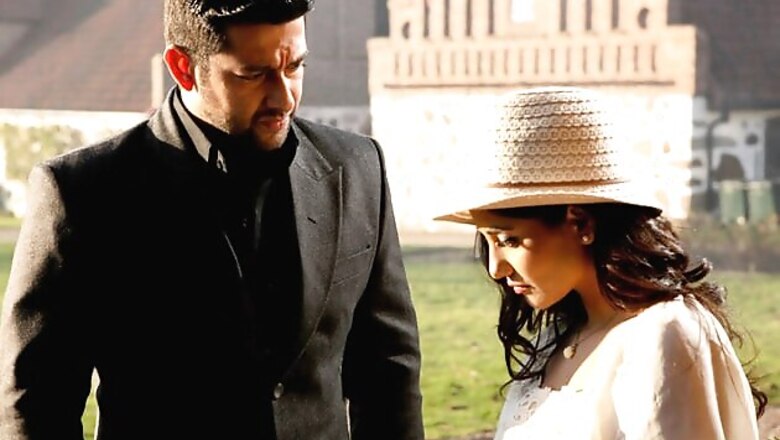
views
Cast: Aftab Shivdasani, Tia Bajpai, Vidya Malvade, Sharad Kelkar
Director: Bhushan Patel
Evil returned and left a trail of some genuinely scary moments and some laughable sequences. A mixture of good vfx, picturesque landscapes, melodious songs, lethargic acting and uselessly over-powering background score couldn’t rise up to the expectations that producer Vikram Bhatt and his team had promised after ‘1920’.
Though ‘1920: Evil Returns’ is not a sequel to ‘1920’ but basic premise is almost the same. A big Victorian villa, a loner, a hopeless lover and a ‘shikari aatma’ (Hunter soul), all join hands to come up with a story that made the audiences wait for songs to avoid the questions on their intelligence.
Jaidev Varma (Aftab Shivdasani) is an acclaimed poet who gets an ardent admirer in Smriti (Tia Bajpai). The studious kind of lady couldn’t make it to Jaidev’s poetry recitation event, so she sends a letter to him, and then a series of love letters keeps them engaged for more than two years. Now, when they are deeply in love and want to meet each other in person for the first time in their lives, an evil spirit (Sharad Kelkar) takes control of the poor lady. What happens afterwards can range from a practical joke to a nightmarish experience, depending on your own bouquet of memories.
‘1920: Evil Returns’ opens with a sequence that has been done to death since the inception of horror films in India. In fact, these ‘ghoda-gaadis’ (Horse carts) and lantern carrying Ramu Kakas have become so redundant that people start giggling the moment anybody even remotely close to these ‘things’ appear on the screen, but the director Bhushan Patel relied on the clichés and proceeded with a scene where the sound designer seems to be at least ten times more scared than the heroine.
What would one do after listening to some weird war cry like sounds in a jungle? Well, Tia Bajpai is a brave girl who goes after the sound despite knowing that her servant hasn’t returned since many minutes. She spots her servant sitting beneath a tree in a thick jungle with his head down; of course she would go there and touch his chin, otherwise how do you think the vfx will come into the play.
But, she is not the only one doing over-acting, Vidya Malvade plays Jaidev’s sister Karuna, who may remind you of ‘talk to my hand’ phrase. Vidya’s hands are her most trusted allies, they fly in the air every time she delivers a dialogue, however some may find it ‘extra minute observation’. Vidya doesn’t get many chances to prove her skills as the focus remains on Tia.
The basic storyline features the pre-independence era when only the privileged class had the access to good medical facilities such as x-ray, but that was competent enough to detect two ghostly claws on the heroine’s shoulders. But, keeping the tradition of horror filmmaking in India in mind, this much liberty should be granted.
Most of the logic are simple and at times lame, but the writer has done one remarkable thing. The character of Sharad Kelkar is shown as someone who uses poetry as pick-up lines on girls but he himself is not a poet. This demonstrates the required traits of a man who can ‘patao’ (charm) a poetry loving damsel later in the film.
But, the same can’t be said about the dialogue writing. Some of the lines evoke a roar of laughter, for example, Jaidev and Smriti intensely search the man/woman/ghost behind a scary laugh for a good five minutes and after finding nothing Jaidev says, “Lagta hai patton ke hilne ki awaz thi,” (It seems it was the rustling of leaves).
There is another scene where a hyper-excited man comes and warns Aftab about evil souls and Aftab’s expressions are like, "Chal jhootha," (Oh come on, get a life), and mind you, this is happening way after the establishment of the ghost.
A good dose of optimism is good but how can you break into a romantic song despite clearly seeing that a locked door opens twice, that too with a Mehmood like creaking sound.
The second half is far better than the first half. Some really scary moments coupled with brilliant body movements by Tia try their best to save the film. The long climax doesn’t appear dragged due to her energy filled performance. Yes, her acrobats make you laugh but they terrify as well, remember one of those nervous laughs!
Afatb is much more capable actor than this. He looks clueless about the proceedings and the effects to be used in the post-production stage. Songs are his forte and those are the only flashes where he appears in charge of the situation.
Sharad Kelkar’s voice comes to his recue and he is satisfactory as the Jaidev’s cunning friend.
The storyteller needs to learn the tricks of the trade to excel in this genre, a bit of ‘The Ring’, ‘The Grudge’ or ‘The Shining’ can work, but the modern Indian sensibilities should also be taken care of, and who better than Vikram Bhatt can explain this to Bhushan Patel.
The hard work put in the cinematography is easily noticeable, lighting has been done with imagination, especially in the jungle shots, together they have succeeded in creating a mystical environment. Songs spread melody, Chirantan Bhatt have come up with at least two heart touching compositions, ‘Khud ko tere’ and ‘Uska hi banana’.
Overall, ‘1920: Evil Returns’ showcases some good ‘horror’ moments in the second half, provided you sustain the tyranny of the first half.
Rating: 1.5 out of 5.
####



















Comments
0 comment